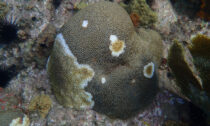
A lethal disease known as stony coral tissue loss is devastating coral colonies across Florida’s coast and much of the northern Caribbean. Likely caused by bacteria or a virus, the disease spreads through water currents and on the bottoms of shipping vessels, reports Douglas Main for National Geographic. It can infect and kill at least 22 coral species, including slow-growing and reef-building corals — which build up massive layers of calcium carbonate and help form fully functioning reef ecosystems.
“Colonies that took hundreds of years to grow can be wiped out in a matter of weeks,” marine ecologist Craig Dahlgren told National Geographic.
The stony coral tissue loss disease outbreak could put even more pressure on Caribbean corals, which are already severly threatened by climate change, experts say. However, humans are also to blame: A recent study revealed that two crucial coral species in the Caribbean started declining decades before climate change began impacting the world’s oceans — showing that overfishing and coastal development can have drastic impacts on coral reefs.
“Local human activities such as overfishing and coastal development have been weakening coral reef health for quite some time,” said Katie Cramer, Conservation International’s ocean science fellow and the study’s lead author. “Local actions matter for the future of coral reefs. The best way to help them cope with the intensifying impacts of ocean warming is to reduce these other stressors affecting them.”














Social Profiles